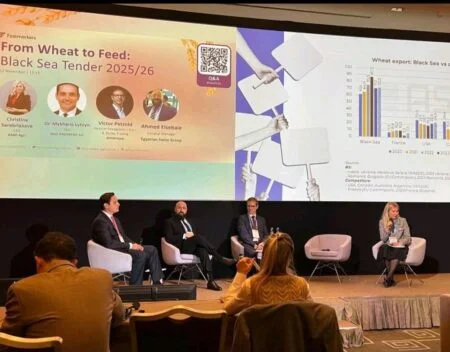Egyptian Swiss Group Represents Egypt at “Global Grain Geneva 2025”

Egyptian Swiss Group for Pasta, Milling, and Concentrates represented Egypt at the Global Grain Geneva 2025 conference in Switzerland—one of the world’s largest and most influential international forums dedicated to the grains, oilseeds, and supply-chain industries. During the event, Eng. Ahmed El-Sebai, the group’s General Manager, delivered a keynote address revealing the latest developments in Egypt’s wheat market throughout 2025.
ElSebai announced that Egypt’s wheat imports reached 2 million tons in October 2025, marking the highest monthly level this year and registering a 28.7% increase compared to September. He emphasized that this performance demonstrates Egypt’s continued ability to secure its strategic wheat needs despite ongoing volatility in global markets.
The Global Grain Geneva conference—organized annually by Fastmarkets—is widely recognized as a flagship gathering for major players in global wheat, grains, and oilseeds trading. It serves as a benchmark event for industry stakeholders seeking market intelligence, trade signals, and future outlooks.
ElSebai added that Egypt’s total wheat imports between January and October 2025 reached 10.87 million tons, with a monthly average of 1.09 million tons. This figure is lower than the 2024 average of 1.22 million tons, indicating that Egypt is likely to close 2025 with a 15%–20% decline in total imports, supported by increased domestic production.

Ukraine Overtakes Russia for the First Time in Years
ElSebai highlighted a significant shift in Egypt’s wheat import origins. The country’s reliance on Russian wheat dropped from 74% to 56% in 2025, while Ukraine’s share surged from 13% to 31%. France also increased its share to 3.6% (up from 1.2%), whereas Romania’s share declined from 6.6% to 4.6%.
He noted that September 2025 marked the first time in years that Ukrainian shipments surpassed Russian ones, reaching 48.5% versus 47.4%, a development he described as a “turning point” in Egypt’s diversification of import sources.
Local Production Growth and a Stronger Private Sector Role
In his speech, ElSebai stressed the strategic importance of wheat for Egypt’s food security, pointing to the notable expansion of wheat cultivation areas and a rise in domestic production from 9 million tons in 2024 to 10 million tons in 2025. This increase reduced import dependency and helped stabilize the market.
He noted that Egypt’s accelerated wheat-growing strategy has directly contributed to lower import volumes and enhanced food security, particularly after the most recent season’s million-ton production increase.
El-Sebai also explained that the “Future of Egypt” Company has become the government’s primary wheat-buying entity, while some shipments continue to arrive under the General Authority for Supply Commodities (GASC) to benefit from port-handling exemptions.
Meanwhile, the private sector’s share of wheat imports rose to 57% in 2025, up from 55.4% last year. El-Sebai underscored the private sector’s pivotal role in Egypt’s milling and pasta industries, describing it as a “primary engine” in transforming imported wheat into value-added products for both domestic and export markets.
Why Imports Declined in 2025
According to El-Sebai, the drop in wheat imports this year is linked to several key factors:
An increase of 1 million tons in domestic production versus 2024.
A strong strategic stockpile reinforced by record imports in 2024.
Imported wheat being traded in the local market below replacement cost, prompting many mills to delay purchases.
A continued rise in Egyptian flour exports, reaching 1.1 million tons in 2024, compared with 750,000 tons in 2023.
A Future Outlook for Egypt’s Wheat Market
El-Sebai concluded that Egypt’s wheat market is undergoing a “structural reshaping phase,” characterized by a redefined balance between government and private-sector roles, expanded reliance on European and Eastern European origins, and further growth in flour exports. These shifts, he said, are enhancing the market’s resilience and its capacity to absorb fluctuations in global commodity prices.
مواضيع متعلقة
- وزير المالية: انخفاض الدين الخارجي لأجهزة الموازنة 12% خلال عامين
- البنك “العربي الإفريقي الدولي” يحدد ملامح استراتيجيته حتى 2030
- “إندرايف” تطلق مسابقة رمضانية للسائقين بجوائز عملات ذهبية وملابس عيد وقسائم وقود
- HONOR تحصد «جائزة الابتكار التكنولوجي المسؤول» ضمن جوائز تكنوتايم للتميز 2025








